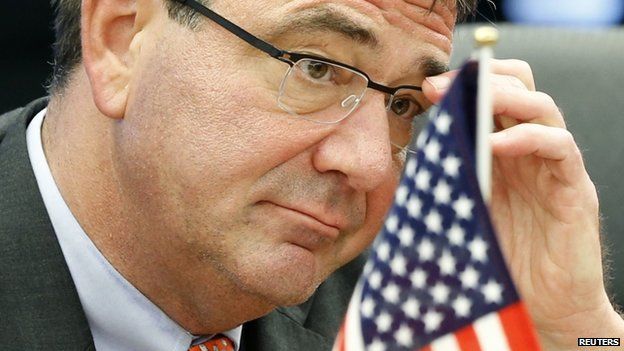Profile: Ashton Carter
- Published

Ashton Carter, a former top Pentagon official, has been tapped by President Barack Obama as the new US defence secretary following Chuck Hagel's resignation in November.
Mr Carter previously served as deputy secretary of defence from October 2011 to December 2013.
White House spokesman Josh Earnest has said the Pentagon official "very, very ably" served in his earlier role and had easily been confirmed by the US Senate in the past.
"This is an indication that he fulfils some of the criteria that we've discussed," Mr Earnest said. "He is somebody who definitely deserves and has demonstrated strong bipartisan support for his previous service in government."
The Rhodes Scholar quickly rose to the top of the White House's shortlist of candidates after Mr Hagel announced his departure following rumours of disagreement with the administration.
Mr Hagel, a 68-year-old Vietnam war veteran and former Republican senator, was reportedly sharply critical of the US strategy against Islamic State and in relation to the Syria regime.
Mr Carter, 60, comes to the post following a long career in US defence.
He earned bachelor's degrees in medieval history and physics from Yale University before receiving his doctorate in theoretical physics from Oxford University.
During former President Bill Clinton's administration, Mr Carter served as Assistant Secretary of Defense for International Security Policy.
He later served as Under Secretary of Defense for Acquisition, Technology and Logistics from April 2009 until October 2011, where he led efforts to strengthen US defenses against emerging threats, according to the Pentagon.
He subsequently served as Deputy Secretary of Defense until the end of 2013.
But his famed attention to detail has caught the eye of commentators.
"The job that seemingly nobody wants has somehow found its perfect fit," writes Adam Chandler in The Atlantic.
"In addition to holding the top two positions at the Pentagon, Carter is known for being 'an uber-wonk,' a label bestowed upon him by Chairman of the Joint Chiefs of Staff Gen. Martin Dempsey last year. And for good reason."
During his tenure at the Pentagon, he was awarded four times the Department of Defense Distinguished Service Medal, as well as the Defense Intelligence Medal.
In addition to his time spent in the public sector, Mr Carter also headed the Center for Science and International Affairs at Harvard University's John F Kennedy School of Government and served as chairman of the Editorial Board of International Security.
Previously, he held positions at the Massachusetts Institute of Technology, the Congressional Office of Technology Assessment, and Rockefeller University.
He was also senior partner at Global Technology Partners, a member of the Aspen Strategy Group and an advisory board member of the Massachusetts Institute of Technology's Lincoln Laboratories.
The married father of two also collaborated on 11 books and authored many articles, scientific publications and government studies.
"He's a technocrat and a good manager," Jane Harman, president of the Wilson Center, told the Associated Press news agency.
"He knows the acquisitions side of the building and has impressed the military with his commitment to the troops."
The Senate Armed Services Committee's top Republican, Senator Jim Inhofe, said he "strongly" supported Mr Carter's nomination.
"I'm very pleased he is going to be our secretary of defense," he said. "I can't imagine that he's going to have opposition to his confirmation."
- Published2 December 2014